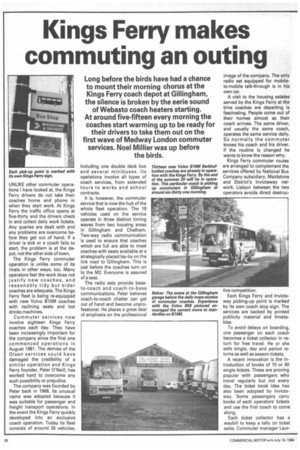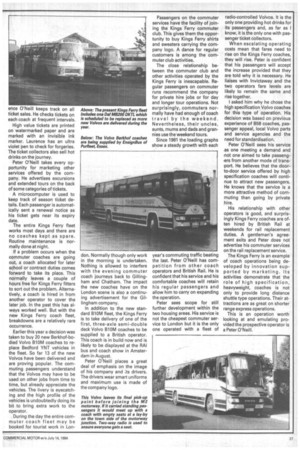Kings Ferry makes commuting an outing
Page 28

Page 29

If you've noticed an error in this article please click here to report it so we can fix it.
Long before the birds have had a chance to mount their morning chorus at the Kings Ferry coach depot at Gillingham, the silence is broken by the eerie sound of Webasto coach heaters starting.
At around five-fifteen every morning the coaches start warming up to be ready for their drivers to take them out on the first wave of Medway London commuter services. Noel Millier was up before the birds.
UNLIKE other commuter operations I have looked at, the Kings Ferry drivers do not take their coaches home and phone in when they start work. At Kings Ferry the traffic office opens at five-thirty and the drivers check in and collect daily work tickets. Any queries are dealt with and any problems are overcome before they get out of hand. If a driver is sick or a coach fails to start, the problem is at the depot, not the other side of town.
The Kings Ferry commuter operation is unlike some of its rivals in other ways, too. Many operators feel the work does not justify new coaches, and reasonably tidy but older coaches are adequate. The Kings Ferry fleet is being re-equipped with new Volvo B1OM coaches with reclining seats and hot drinks machines.
Commuter services now involve eighteen Kings Ferry coaches each day. They have been increasingly important for the company since the first one commenced operations in August 1981. The demise of the Olsen services could have damaged the credibility of a similar operation and Kings Ferry founder, Peter O'Neill, has worked hard to overcome any such possibility or prejudice.
The company was founded by Peter back in 1968. Its unusual name was adopted because it was suitable for passenger and freight transport operations. In the event the Kings Ferry quickly developed into an exclusive coach operation. Today its fleet consists of around 35 vehicles, including one double deck bus and several minibuses. Its operations involve all types of coach services, from extended tours to works and school contracts.
It is, however, the commuter service that is now the hub of the whole fleet operation. The 18 vehicles used on the service operate in three distinct timing waves from two housing areas in Gillingham and Chatham. Two-way radio communication is used to ensure that coaches which are full are able to meet coaches with seats available at a strategically placed lay-by on the link road to Gillingham. This is just before the coaches turn on to the M2. Everyone is assured of a seat.
The radio sets provide baseto-coach and coach-to-base communications. Peter believes coach-to-coach chatter can get out of hand and become unprofessional. He places a great deal of emphasis on the professional image of the company. The only radio set equipped for mobileto-mobile talk-through is in his own car.
A visit to the housing estates served by the Kings Ferry at the time coaches are departing is fascinating. People come out of their homes almost as their coach arrives. The same driver, and usually the same coach, operates the same service daily. So normally the commuter knows his coach and his driver. If the routine is changed he wants to know the reason why.
Kings Ferry commuter routes are arranged to complement the services offered by National Bus Company subsidiary, Maidstone and District's lnvictaway network. Liaison between the two operators avoids direct destruc tive competition.
Each Kings Ferry and Invictaway picking-up point is marked by its own coach stop sign. The services are backed by printed publicity material and timetables.
To avoid delays on boarding, one passenger on each coach becomes a ticket collector in return for free travel. He or she sells single, day and period returns as well as season tickets.
A recent innovation is the introduction of books of 10 or 40 single tickets. These are proving popular with passengers who travel regularly but not every day. The ticket book idea has also been adopted by Invictaway. Some passengers carry books of each operators' tickets and use the first coach to come along.
Each ticket collector has a waybill to keep a tally on ticket sales. Commuter manager Laur ence O'Neill keeps track on all ticket sales. He checks tickets on each coach at frequent intervals.
High value tickets are printed on watermarked paper and are marked with an invisible ink marker. Laurence has an ultra violet pen to check for forgeries. The ticket collectors also sell hot drinks on the journey.
Peter O'Neill takes every opportunity for marketing other services offered by the company. He advertises excursions and extended tours on the back of some categories of tickets.
A microcomputer is used to keep track of season ticket details. Each passenger is automatically sent a renewal notice as his ticket gets near its expiry date.
The entire Kings Ferry fleet works most days and there are no coaches kept as spare. Routine maintenance is normally done at night.
If a problem occurs when the commuter coaches are going out, a coach allocated for later school or contract duties comes forward to take its place. This normally leaves a couple of hours free for Kings Ferry fitters to sort out the problem. Alternatively, a coach is hired in from another operator to cover the later job. In the past this has always worked well. But with the new Kings Ferry coach fleet, breakdowns are a relatively rare occurrence.
Earlier this year a decision was taken to buy 20 new Berkhof-bodied Volvo B1OM coaches to replace Bedford YNT vehicles in the fleet. So far 13 of the new Volvos have been delivered and are proving popular. The commuting passengers understand that the Volvos may have to be used on other jobs from time to time, but already appreciate the vehicles. The livery is eyecatching and the high profile of the vehicles is undoubtedly doing its bit to bring extra work to the operator.
During the day the entire commuter coach fleet may be booked for tourist work in Lon don. Normally though only work in the morning is undertaken. Nothing is allowed to interfere with the evening commuter coach journeys back to Gillingham and Chatham. The impact the new coaches have on the London scene is also a continuing advertisement for the Gillingham company.
In addition to the new standard B1OM fleet, the Kings Ferry is to take delivery of one of the first, three-axle semi-double deck Volvo B1OM coaches to be supplied to a British operator. This coach is in build now and is likely to be displayed at the RAI bus and coach show in Amsterdam in August.
Peter O'Neill places a great deal of emphasis on the image of his company and ;ts drivers. The drivers wear smart uniforms and maximum use is made of the company logo. Passengers on the commuter services have the facility of joining the Kings Ferry commuter club. This gives them the opportunity to buy Kings Ferry shirts and sweaters carrying the company logo. A dance for regular customers is among the cornmuter club activities.
The close relationship between the commuter club and other activities operated by the Kings Ferry is inescapable. Regular passengers on commuter runs recommend the company for private hire jobs or for day and longer tour operations. Not surprisingly, commuters normally have had enough of coach travel by the weekend. Nevertheless, their uncles, aunts, mums and dads and grannies use the weekend tours.
Since 1981 the loading graphs show a steady growth with each year's commuting traffic beating the last. Peter O'Neill has competition from other coach operators and British Rail. He is confident that his service and his comfortable coaches will retain his regular passengers and allow him to carry on expanding the operation.
Peter sees scope for still further development within the two housing areas. His service is not the cheapest commuter service to London but it is the only one operated with a fleet of radio-controlled Volvos. It is the only one providing hot drinks for its passengers and, as far as I know, it is the only one with passenger ticket collectors.
When escalating operating costs mean that fares need to rise on the Kings Ferry coaches, they will rise. Peter is confident that his passengers will accept the increase provided that they are told why it is necessary. He liaises with Invictaway and the two operators fare levels are likely to remain the same and rise together.
I asked him why he chose the high specification Volvo coaches for this type of operation. His decision was based on previous experience of B58 coaches, passenger appeal, local Volvo parts and service agencies and the need for standardisation.
Peter O'Neill sees his service as one meeting a demand and not one aimed to take passengers from another mode of transport. He believes that the doorto-door service offered by high specification coaches will continue to attract new passengers. He knows that the service is a more attractive method of commuting than going by private hire.
His relationship with other operators is good, and surprisingly Kings Ferry coaches are often hired by British Rail at weekends for rail replacement duties. A gentleman's agreement exits and Peter does not advertise his commuter services on the rail replacement service.
The Kings Ferry is an example of coach operations being developed by innovation supported by marketing. Its activities demonstrate that the role of high specification, heavyweight, coaches is not only to provide long distance shuttle type operations. Their attractions are as great on shorter range express operations.
This is an operation worth looking at and emulating provided the prospective operator is a Peter O'Neill.
























































































